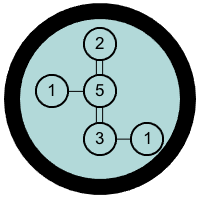Course: Math 555, Spring 2016.
Instructor: Christopher Hanusa — Email: chanusa@qc.cuny.edu — Office: Kiely Tower 606
Meeting Times: Mondays and Wednesdays from 1:40–2:55 in KY 277
Course Web Site: http://qc.edu/~chanusa/courses/555/16/
Grades will be posted on Gradesly.
"Textbook": Puzzlecraft by Mike Selinker and Thomas Snyder, ISBN: 9781402779244
You will also need to purchase the February 2016 copy of Games World of Puzzles. (You can buy a physical copy from that website OR you might be able to find one in a store such as Barnes and Noble. It is also possible to buy a digital edition through the website, but myself, I certainly prefer a physical copy!)
Class Participation:
This class is very participation intensive. We will be solving puzzles in class and sharing solution methods in groups and at the board. You will earn a class participation grade based on your attendance and your participation.
If you miss a class, you are responsible for the material you missed—get the notes from your classmates and study group and make sure that you understand the material that you missed.
Study Groups:
An important component of your learning in this class is through study groups. Study groups allow you to learn the intricacies of the material; discussion of problems often lead to better understanding and new and more efficient ways to solve the problems. One of the best ways to learn something is to explain it to someone else; misunderstandings that you never knew you had will appear under someone else's questioning! In addition, seeing that others also struggle with the material helps to put your own level of understanding in a better perspective and will hopefully reduce some of your anxiety. If you can not find a study group, e-mail me so that I can help you get involved.
Most importantly, I assume that you will be working in groups when I make up the homework assignments. Study groups good. Copying solutions bad. When a group works on a problem, everyone can participate. But when you write up the answers to the problems, write it up in your own way. I will take off points from all parties if multiple solutions are the same. Be sure to include an acknowledgment to your groupmates on your homework.
Graded Assignments:
The plan for graded assignments is slowly coming into focus. I do not anticipate any exams. Assignments may include:
- One-page-long essays about the history of certain puzzles and related solving techniques.
- Curation of content for a wiki about puzzles, puzzle solving, and puzzle creation.
- New puzzles with accompanying discussion of the methods used to create them.
- The uploading of puzzles to web repositories.
- The creation of a puzzle trove.
Grading Scheme:
Your grade will be based on class participation and graded assignments. Each component of your grade is calculated independently; then all pieces are combined. A rough approximation of the weighted average used to combine the grades is the following.
Class Participation: 25%
Graded Assignments: 50%
Final Project: 25%
Office Hours:
I am happy to help you with your homework and other class-related questions during my office hours. I have official office hours as posted on my schedule. In addition, you are welcome to make an appointment or stop by my office in Kiely Tower Room 606 at any time. (You can call 718-997-5964 to see if I'm there.)
Cheating/Plagiarism:
DON'T DO IT! It makes me very mad and very frustrated when students cheat. Cheating is the quickest way to lose the respect that I have for each student at the beginning of the semester.
Working together on homework is encouraged and is certainly not considered cheating. On the other hand, copying someone else's homework solutions IS cheating.
I take cheating very seriously. If you cheat, you will receive a zero for the assignment and I will report you to the academic integrity committee in the Office of Student Affairs to be placed on your permanent file. If you cheat twice, you will receive a zero for the class.
Accommodations for Students with Disabilities:
Students with disabilities needing academic accommodation should register with and provide documentation to the Office of Special Services, Frese Hall, room 111. The Office of Special Services will provide a letter for you to bring to your instructor indicating the need for accommodation and the nature of it. This should be done during the first week of class. For more information about services available to Queens College students, contact the Office of Special Services (718-997-5870) or visit their website (http://sl.qc.cuny.edu/oss/). If you need special accommodation for an exam, you MUST contact me at least one week beforehand.
Course Evaluations
During the final four weeks of the semester, you will be asked to complete an evaluation for this course by filling out an online questionnaire. Please remember to participate in these course evaluations. Your comments are highly valued, and these evaluations are an important service to fellow students and to the institution, since your responses will be pooled with those of other students and made available online, in the Queens College Course Information System (http://courses.qc.cuny.edu). Please also note that all responses are completely anonymous; no identifying information is retained once the evaluation has been submitted.
Technical Support
The Queens College Helpdesk (http://www.qc.cuny.edu/computing/, (718) 997-4444, helpdesk@qc.cuny.edu) is located in the I-Building, Room 151 and provides technical support for students who need help with Queens College email, CUNY portal, Blackboard, and CUNYfirst.
